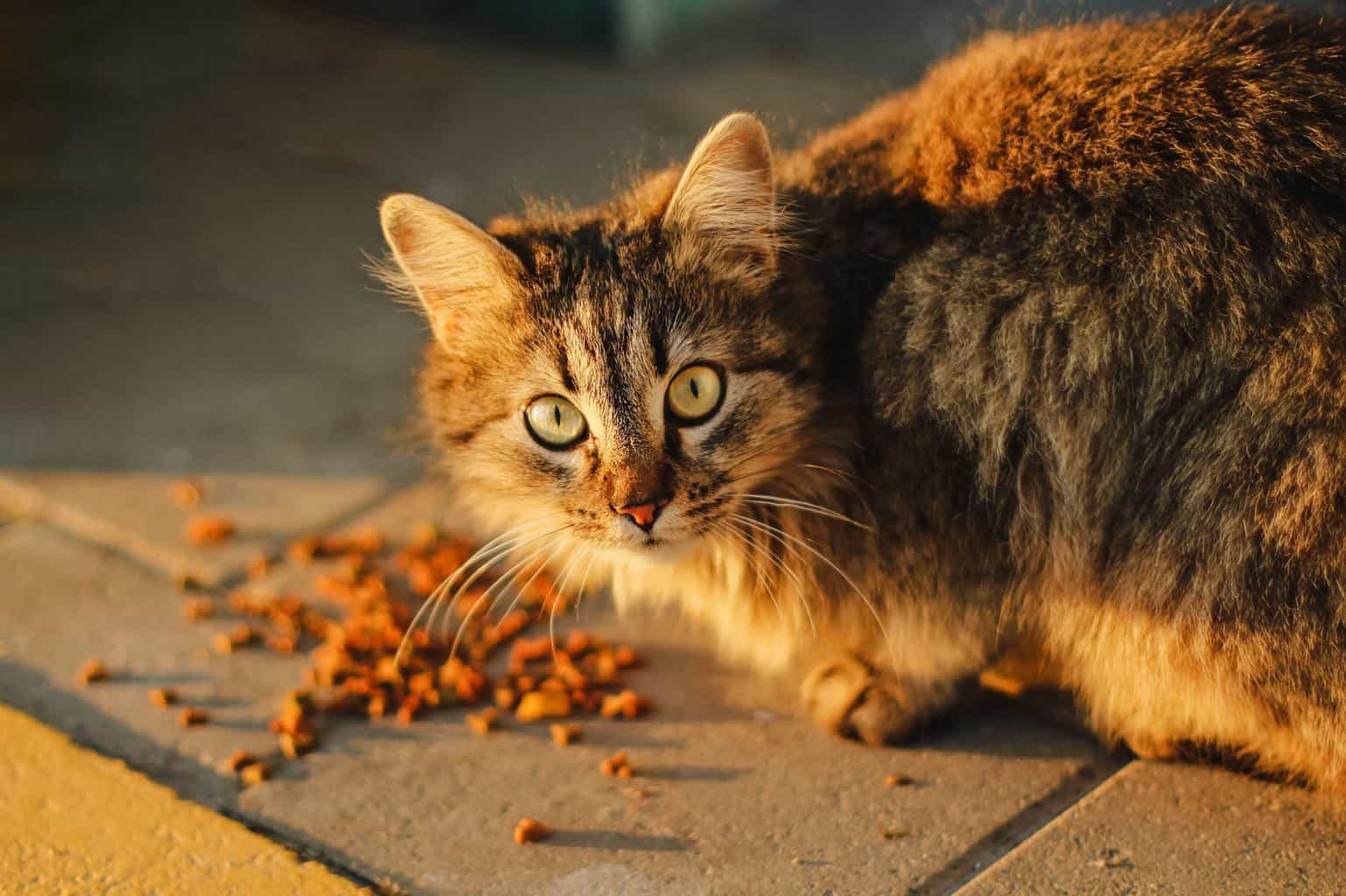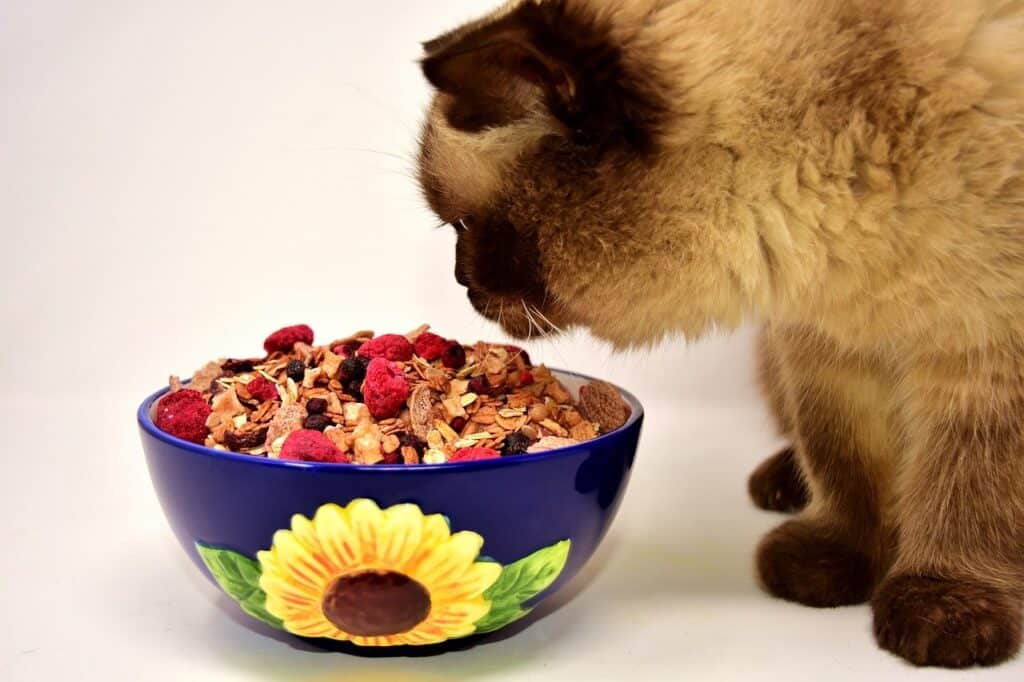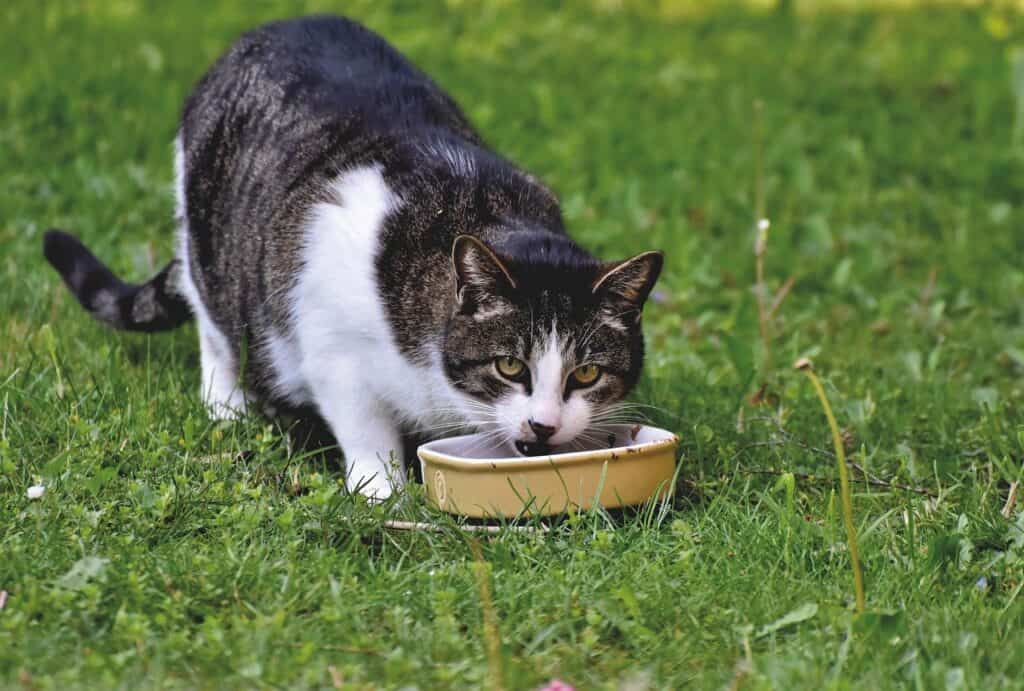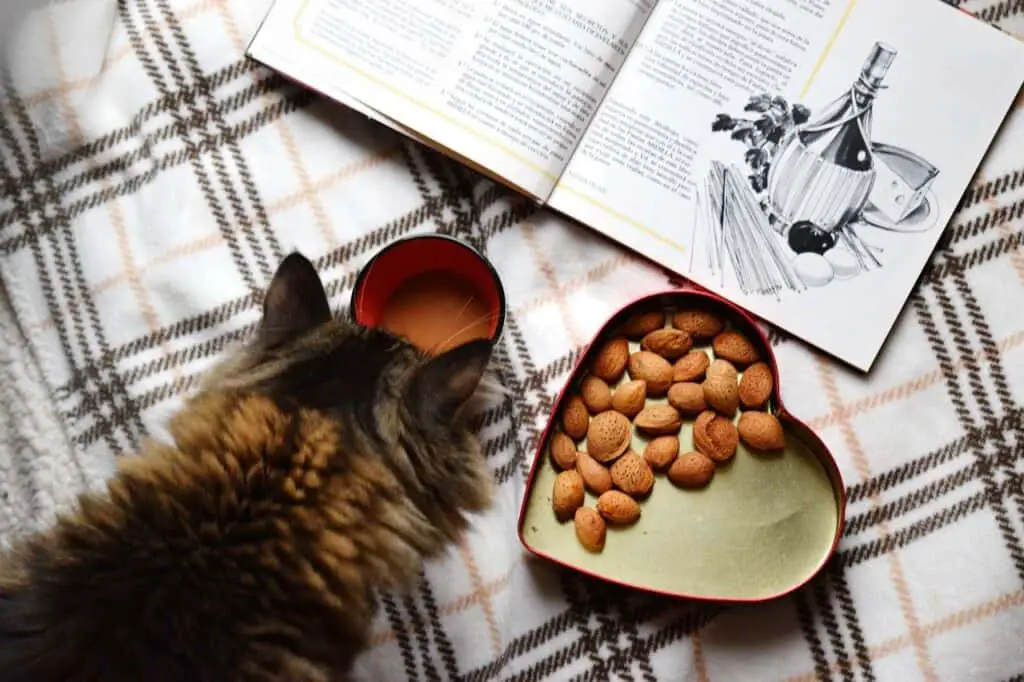Most cat owners will have seen their furry friends playing with their food at some point. It can look like cruel and unusual punishment when the food is a living animal—like a mouse or small bird—but it can be a little confusing when it’s a treat or cat biscuits.
Why do cats play with their food?
Cats play with their food because of their instincts. They are avid hunters, and even when they are fed by humans and don’t need to hunt for food, they can’t ignore those instincts. Hunting is something cats enjoy, it stimulates them, keeps them fit, and they will act it out, even if it is not borne of hunger.
But why should a deep, primal instinct to hunt prey lead to your cat batting their cat biscuits around the kitchen floor and making a mess?
Does evolution have something to do with it?
Evolutionary behavior is hard to shake. Cats might have been domesticated as early as 10,000 years ago, but that’s a mere drop in the ocean compared to the millions of years that modern cats have been around. Those primal hunting instincts are still there!
Don’t worry, I’m not going to go full Charles Darwin on you, but it helps to understand that evolution is not some focused phenomenon with a specific goal in mind.
Essentially, life throws everything at the wall to see what sticks. If a change makes that animal more likely to survive long enough to breed and pass its genes on, that’s a success.
For example, the fact that humans enjoy sex provides an evolutionary advantage because more sex leads to more humans. Many poisonous substances taste awful to us because animals who found the poison revolting didn’t eat it. The result was that these animals lived long enough to make more animals, whereas any animals that found the poison tasty would have eaten it and die before they could breed.
Now, a cat’s thought processes aren’t as complex as ours or as developed, but they still feel a cat equivalent of happiness (perhaps contentedness would be a better word) and sadness.
Cats need stimulation to avoid boredom, like the rest of us, and they get some of that stimulation from hunting. Evolutionarily speaking, cats that hunt are more likely to survive, so cats have evolved to enjoy hunting.
Why do wild cats play with their food?
What about domesticated cats? They don’t NEED to hunt, right?
Unfortunately, typical domesticated cats don’t get many opportunities to hunt in the course of their day. Cats that spend a lot of time outside—including strays-and just cats that like to be out and about and, of course, wild cats— have a different natural feeding pattern and will typically eat as much as thirty times a day.
They will constantly be scouting for small prey, and the hunt itself provides them with stimulation because, as we mentioned above, cats that enjoy hunting are more likely to hunt, and cats that hunt are, historically, more likely to survive.
Cats that live mostly indoors and have regular access to food with their meals laid out do not get the stimulation that outdoor cats enjoy, but they do need that stimulation, so they replicate it.
Unintended Consequences
We can look to humans once more for examples of evolution not being perfect. For example, we need sugar in our diets, but sugar was not easy to find for most of humanity’s evolutionary history. We developed a taste for sugar because those who preferred sugar were more likely to survive.
Now, in a time when sugar is abundant, we have obesity crisis’ and governments are regulating sugary soda.
For cats, the unintended consequences of their evolution are far less severe. They get the same stimulation from batting cat biscuits around as they would from chasing animals through the wilderness. So, when they spend long hours indoors not doing much, you shouldn’t be surprised if they develop a habit of toying with their food.
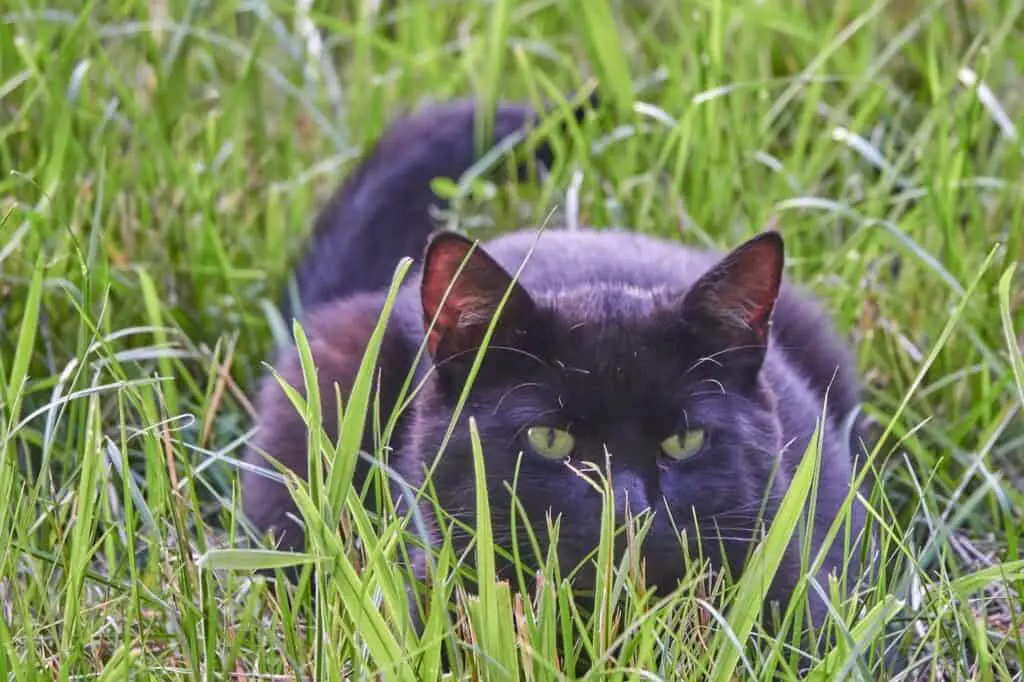
What About Actual Prey?
Cats don’t just play with cat biscuits, of course. Many cat owners have had the disconcerting experience of finding a small, dead animal in their home. In the worst cases, the animal might not be dead… yet.
Domestic cats also toy with animals they catch, and in fact, quite often, don’t eat their prey at all. This is because there seems to be a disconnect between your cat’s hunger and its drive to hunt.
As we’ve established, the hunting behavior itself is not necessarily borne of hunger for domestic cats but is a product of boredom.
House cats will occasionally have the opportunity to actually hunt something rather than just play with their food. Obviously, this is great from a simulation point of view, but it doesn’t change the fact that the cat is well-fed and does not need to look for alternative food sources.
Essentially, when your cat is playing with live (or dead) pray that it has caught, it is doing the same thing that it does its biscuits—getting that hunt-induced stimulation. It’s unfortunate for the animal it catches, but go easy on your cat; it literally doesn’t know any better.
Is My Cat Playing With Its Food a Problem?
The natural follow-up question to learning that your cat playing with its food is a sign of under-stimulation is; is there something I should worry about?
There is no universal answer to this question.
One way to look at it is if your cat is playing with its food, it is under-stimulated to some degree, and you can always offer your cat more stimulation. However, a cat that only occasionally plays with its food may just be having a slow day and might be fine overall.
Where it becomes a problem is if your cat is severely under-stimulated, which will come with other changes in behavioral patterns besides playing with their food. Here are some warning signs to look out for.
Over-Grooming/Repetitive Behavior
Under-stimulated cats tend to over-groom themselves. They might even start chewing and biting on themselves, possibly pulling out hair in the process. The problem with this behavior is that it creates irritation—as you would expect, it can cause your cat to groom more, creating something of a vicious circle.
A Lack of Curiosity
Even the most sedate of cats will occasionally go for a stroll and inspect its surroundings, including engaging in a bit of playtime with toys, other animals, or you. If you notice your cat isn’t doing much of anything—if their activities involve sleeping and eating and not much else—your cat may be under-stimulated.
Fighting
If your cat is not alone—if there are other cats, or perhaps a dog or two in the house—and they have developed a habit of fighting with them with little-to-no provocation, this is also a warning sign.
Over-Eating
This seems to be a thing many mammals have in common—especially us humans—but your cats, when bored and under-stimulated, may start eating more. Unfortunately, this leads to a bit of a downward spiral—much like in humans—where the lethargy and general unhealthiness that comes with being overweight further depresses the cat, which can lead to them eating more.
It’s worth noting that over-eating (and under-eating) can be a sign of other problems, too. If you notice this behavior in your cat, it’s best to get them to a veterinarian to be on the safe side.
How to Deal With Your Cat’s Boredom
If you are sure there are no other health issues at play, you can begin to look at ways to give your cat a more stimulating environment.
Fortunately, this is exactly as simple as you might think; plenty of toys, high places to climb scratching posts, and plenty of areas where your cat can settle down and enjoy watching the outside world. Just because your cat is an indoor cat doesn’t mean they don’t like to watch nature.
Tip: to fight cat boredom and engage their hunter instinct, a puzzle feeder, is a great way to stimulate your cat and reward them with a treat. Amazon has quite the collection. You can check them out here.
What if My Cat Doesn’t Want to Play?
If your cat is playing with its food, but nothing you try seems to interest it enough to put a stop to it, it could just be that you are not trying things that interest the cat. That being said, there could be something else at play.
Your cat may have a health concern that is causing it to be less interested in whatever you are trying. It doesn’t take much energy to bat a biscuit around from a sitting position, but chasing a cat toy around the floor would be difficult for a cat with arthritis.
It is always worth watching your cat closely. Especially when a cat with a normally active lifestyle suddenly changes to a sedentary cat. If that’s the case, there may be something wrong, but usually, there will also be other clues about what that might be.
Final Thoughts
Ultimately, there is no getting around biology, and cats have evolved to hunt. Their bodies are built for it, and their brains are satisfied by it. In much the same way that a filling meal will stave off the cravings for unhealthy snacks in humans, plenty of stimulation will make the chances of your cat playing with its food much slimmer.
Remember to look out for the other signs that your cat may be under-stimulated, such as over-eating, repetitive behavior, over-grooming, and a general lack of curiosity. And, if you suspect something is off about your feline friend, monitor them closely, as the problem might not be what you think.
Regardless of whether your cat plays with their food, you should always strive to give them a stimulating environment that keeps them active and interested in their environment. Few creatures are built to be sedentary, and, despite all the lying around and sleeping, cats are not one of them.
Sources

